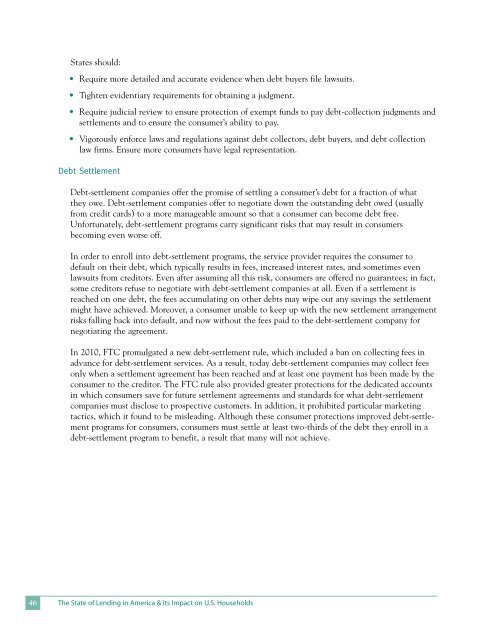Create successful ePaper yourself
Turn your PDF publications into a flip-book with our unique Google optimized e-Paper software.
States should:<br />
• Require more detailed and accurate evidence when debt buyers file lawsuits.<br />
• Tighten evidentiary requirements for obtaining a judgment.<br />
• Require judicial review to ensure protection <strong>of</strong> exempt funds to pay debt-collection judgments and<br />
settlements and to ensure the consumer’s ability to pay.<br />
• Vigorously enforce laws and regulations against debt collectors, debt buyers, and debt collection<br />
law firms. Ensure more consumers have legal representation.<br />
Debt Settlement<br />
Debt-settlement companies <strong>of</strong>fer the promise <strong>of</strong> settling a consumer’s debt for a fraction <strong>of</strong> what<br />
they owe. Debt-settlement companies <strong>of</strong>fer to negotiate down the outstanding debt owed (usually<br />
from credit cards) to a more manageable amount so that a consumer can become debt free.<br />
Unfortunately, debt-settlement programs carry significant risks that may result in consumers<br />
becoming even worse <strong>of</strong>f.<br />
In order to enroll into debt-settlement programs, the service provider requires the consumer to<br />
default on their debt, which typically results in fees, increased interest rates, and sometimes even<br />
lawsuits from creditors. Even after assuming all this risk, consumers are <strong>of</strong>fered no guarantees; in fact,<br />
some creditors refuse to negotiate with debt-settlement companies at all. Even if a settlement is<br />
reached on one debt, the fees accumulating on other debts may wipe out any savings the settlement<br />
might have achieved. Moreover, a consumer unable to keep up with the new settlement arrangement<br />
risks falling back into default, and now without the fees paid to the debt-settlement company for<br />
negotiating the agreement.<br />
In 2010, FTC promulgated a new debt-settlement rule, which included a ban on collecting fees in<br />
advance for debt-settlement services. As a result, today debt-settlement companies may collect fees<br />
only when a settlement agreement has been reached and at least one payment has been made by the<br />
consumer to the creditor. <strong>The</strong> FTC rule also provided greater protections for the dedicated accounts<br />
in which consumers save for future settlement agreements and standards for what debt-settlement<br />
companies must disclose to prospective customers. In addition, it prohibited particular marketing<br />
tactics, which it found to be misleading. Although these consumer protections improved debt-settlement<br />
programs for consumers, consumers must settle at least two-thirds <strong>of</strong> the debt they enroll in a<br />
debt-settlement program to benefit, a result that many will not achieve.<br />
46<br />
<strong>The</strong> State <strong>of</strong> Lending in America & its Impact on U.S. Households


